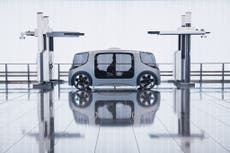Ford to go ‘all electric’ in Europe by 2030
Carmakers in EU under pressure to sell more electric vehicles to meet new limits on CO2 emissions

Car giant Ford has pledged to make all its European passenger vehicles electric by 2030, in keeping with the EU’s strict new limits on carbon dioxide emissions.
The manufacturer will spend more than £720m revamping its factory in Cologne, Germany, its president announced during an online news conference on Wednesday.
Stuart Rowley said Ford of Europe had struck a deal with Volkswagen to use the German company’s renowned mechanical framework – the same one that built VW’s ID.3 compact, one of 2020’s best-rated small electric vehicles (EVs).
Ford’s new electric car will reach the market in mid-2023 and could be followed by a second one soon after. It is all part of Ford’s goal to spend at least $15bn (£10.8bn) on EVs from now through 2025.
Carmakers in Europe are under pressure to sell more EVs to meet new, lower limits on emissions of CO2 – the main greenhouse gas blamed for global warming – as part of the bloc’s efforts to comply with the 2015 Paris Agreement.
As of January 2021, the EU fleet-wide average emission target for new cars is 95g CO2/km, which corresponds to a fuel consumption of around 4.1L/100 km of petrol or 3.6L of diesel.
Hefty fines face car brands within the EU who fail to keep their average emissions below the new limit, but Mr Rowley said earlier Ford was in a position to avoid such penalties moving forwards.
“We are going all in on electric vehicles,” Mr Rowley added, as it was revealed Ford expects two-thirds of its European commercial vehicle sales to be electric or plug-in hybrids by 2030.
The investment into the company’s Cologne factory – which will be made throughout 2025 – is among the most significant Ford has made in more than a generation, underlining “our commitment to Europe and a modern future,” Mr Rowley said.
It also comes at a good time for the German plant itself, which employs just over 4,000 workers, after its European operations returned to a profit in the fourth quarter of 2020 after the damaging effects of coronavirus.
Mr Rowley shared the news just weeks after Ford’s biggest rival, fellow US automaker General Motors, said its entire global fleet would largely be electric by 2035.
Such changes in the auto industry will only become more frequent as world leaders begin enforcing various climate action plans to achieve net-zero emissions by 2050 – a goal shared by economic powers such as the EU, UK, US, Japan and Korea.
China has pledged to do the same by 2060.
Join our commenting forum
Join thought-provoking conversations, follow other Independent readers and see their replies
Comments
Bookmark popover
Removed from bookmarks